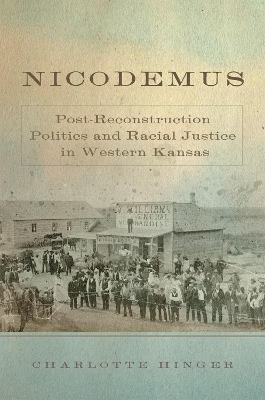
Nicodemus
Post-Reconstruction Politics and Racial Justice in Western Kansas
Seiten
2022
University of Oklahoma Press (Verlag)
978-0-8061-9033-4 (ISBN)
University of Oklahoma Press (Verlag)
978-0-8061-9033-4 (ISBN)
As the first well-known all-black community on the plains, Nicodemus, Kansas, became a national exemplar of black self-improvement. But Nicodemus also embodied many of the problems facing African Americans. Diverging philosophies within the community, Charlotte Hinger argues, foretold the differences that continue to divide today.
Pushed out of the South as Reconstruction ended and as white landowners, employers, and “Redeemer” governments sought to reestablish the constraints of slavery, thousands of African Americans migrated west in search of better opportunities. As the first well-known all-black community on the plains, Nicodemus, Kansas, became a national exemplar of black self-improvement. But Nicodemus also embodied many of the problems facing African Americans during this time. Diverging philosophies within the community, Charlotte Hinger argues, foretold the differences that continue to divide black politicians and intellectuals today.
At the time Nicodemus was founded, politicians underestimated the power of African American voters. But three of the town’s black homesteaders—Abram Thompson Hall, Jr., Edward Preston McCabe, and John W. Niles—exerted extraordinary influence over county, state, and national politics. Hinger examines their divergent strategies for leading their community and for relating to white people, which reflected emerging black worldviews across the United States as African Americans grappled with the responsibilities accompanying their new freedom. Hall supported racial uplift, McCabe insisted on achieving equality through politics and legislation, and Niles advocated reparations for slavery. Hall and McCabe, both northerners, had distinguished educations, while Niles, a former slave, was a gifted orator. Their differing approaches to creating a new civilization on the prairie, seeking justice for blacks, and improving the situation of Nicodemus citizens roiled Kansas politics, already in turmoil over temperance and woman’s suffrage.
Nicodemus was a microcosm of all the issues facing black Americans in the late nineteenth century, and Hall, McCabe, and Niles are archetypes for powerful philosophies that have persisted into the twenty-first century. This study of their ideas and the ways they shaped Nicodemus offers a novel perspective on the most famous post–Civil War African American community in the West.
Pushed out of the South as Reconstruction ended and as white landowners, employers, and “Redeemer” governments sought to reestablish the constraints of slavery, thousands of African Americans migrated west in search of better opportunities. As the first well-known all-black community on the plains, Nicodemus, Kansas, became a national exemplar of black self-improvement. But Nicodemus also embodied many of the problems facing African Americans during this time. Diverging philosophies within the community, Charlotte Hinger argues, foretold the differences that continue to divide black politicians and intellectuals today.
At the time Nicodemus was founded, politicians underestimated the power of African American voters. But three of the town’s black homesteaders—Abram Thompson Hall, Jr., Edward Preston McCabe, and John W. Niles—exerted extraordinary influence over county, state, and national politics. Hinger examines their divergent strategies for leading their community and for relating to white people, which reflected emerging black worldviews across the United States as African Americans grappled with the responsibilities accompanying their new freedom. Hall supported racial uplift, McCabe insisted on achieving equality through politics and legislation, and Niles advocated reparations for slavery. Hall and McCabe, both northerners, had distinguished educations, while Niles, a former slave, was a gifted orator. Their differing approaches to creating a new civilization on the prairie, seeking justice for blacks, and improving the situation of Nicodemus citizens roiled Kansas politics, already in turmoil over temperance and woman’s suffrage.
Nicodemus was a microcosm of all the issues facing black Americans in the late nineteenth century, and Hall, McCabe, and Niles are archetypes for powerful philosophies that have persisted into the twenty-first century. This study of their ideas and the ways they shaped Nicodemus offers a novel perspective on the most famous post–Civil War African American community in the West.
Award-winning novelist and independent historian Charlotte Hinger is the author of several articles and encyclopedia entries on African American history in the West and the novels Come Spring, Deadly Descent, Lethal Lineage, and Hidden Heritage.
| Erscheinungsdatum | 10.03.2022 |
|---|---|
| Reihe/Serie | Race and Culture in the American West Series |
| Verlagsort | Oklahoma |
| Sprache | englisch |
| Maße | 152 x 229 mm |
| Gewicht | 517 g |
| Themenwelt | Geisteswissenschaften ► Geschichte ► Allgemeine Geschichte |
| Geisteswissenschaften ► Geschichte ► Regional- / Ländergeschichte | |
| Sozialwissenschaften ► Ethnologie | |
| Sozialwissenschaften ► Soziologie ► Empirische Sozialforschung | |
| ISBN-10 | 0-8061-9033-7 / 0806190337 |
| ISBN-13 | 978-0-8061-9033-4 / 9780806190334 |
| Zustand | Neuware |
| Haben Sie eine Frage zum Produkt? |
Mehr entdecken
aus dem Bereich
aus dem Bereich
eine Familiengeschichte der Menschheit
Buch | Hardcover (2023)
Klett-Cotta (Verlag)
CHF 68,60
Eine wahre Geschichte von Schiffbruch, Mord und Meuterei
Buch | Hardcover (2024)
C.Bertelsmann (Verlag)
CHF 34,95


